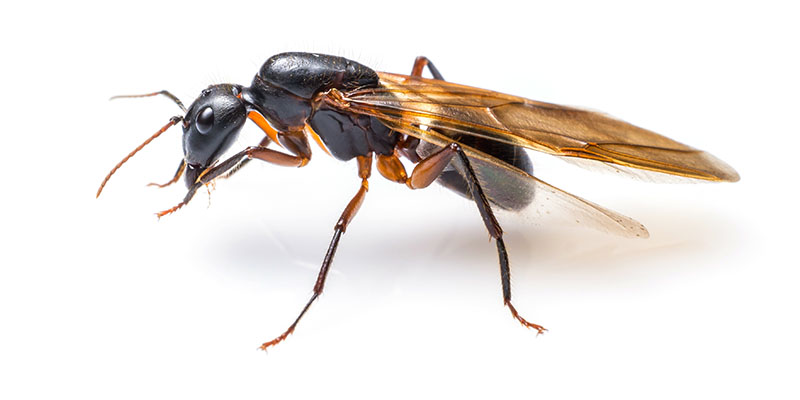People react in different ways to common pests. Weirdly enough, most individuals won’t jump or dart inside when mosquitoes show up and start to bite. But, a scampering spider will send most folks running (after leaping out of their shoes, of course). Ants usually don’t cause fear, but if they’re flying, well, that’s a different story.
Flying insects, particularly wasps, hornets, and such, will invoke plenty of anxiety and flying ants aren’t a blanket exception. But this begs another question, “Can ants fly?” And if so, which species do and don’t? Moreover, what’s the difference between them? Okay, let’s take a few moments to unpack all of this.
Can Ants Fly? The Fascinating Truth About Flying Ants
Most people are surprised to learn that some ants can indeed fly, though not all ants have this ability. The phenomenon of flying ants is one of nature’s most interesting adaptations, playing a crucial role in ant colony reproduction and survival. Let’s explore the intriguing world of flying ants and understand when, why, and which ants take to the skies.
Not All Ants Can Fly
In any ant colony, only specific ants develop wings and the ability to fly. These are the reproductive members of the colony: young queens (also called princesses) and male ants. The majority of ants we see daily—the workers—remain wingless throughout their lives.
The Purpose of Flight: The Nuptial Flight
Flying isn’t just a cool party trick for ants—it serves a vital reproductive purpose. During what’s known as the “nuptial flight” or “marriage flight,” young queens and male ants from different colonies take to the air to mate. This spectacular event usually occurs on warm, humid days, often after rain, when thousands of winged ants emerge simultaneously from their colonies.
The timing isn’t random. Colonies in the same area synchronize their nuptial flights to ensure genetic diversity by allowing queens and males from different colonies to meet. This mass emergence also provides safety in numbers against predators.
The Life Cycle of a Flying Ant
The journey of a flying ant follows a fascinating pattern:
- Development. Within the colony, certain larvae are fed a special diet that allows them to develop into reproductive ants with wings.
- Emergence. When conditions are right, these winged ants emerge from their colonies.
- The flight. Males and young queens take to the air, with males typically dying shortly after mating.
- New beginnings. After mating, the queen lands and immediately breaks off her own wings—she won’t need them again. She then begins searching for a suitable location to start her new colony.
- Colony foundation. Using stored fat reserves and the protein from her now-useless wing muscles, the queen sustains herself while laying her first batch of eggs.
When Do Ants Fly?
Flying ant season varies by species and geography, but in many regions, it occurs during the warmer months. In the United Kingdom, for example, there’s even a phenomenon known as “Flying Ant Day,” though it’s actually a period of several weeks when different colonies release their winged ants. Weather conditions play a crucial role:
- Warm temperatures
- High humidity
- Low wind speeds
- Often follows rainfall
- Usually occurs in the afternoon or early evening
Identifying Flying Ants
Flying ants are often mistaken for termites, but there are key differences:
- Ants have a narrow waist and bent antennae
- Their front wings are longer than their back wings
- They have darker, more robust bodies than termites
- Their wings are less transparent than termite wings
Common Questions About Flying Ants
Okay, that’s quite a bit to digest but it doesn’t answer all the questions most people have when it comes to flying ants. So, let’s answer the most frequently asked questions about these insects, starting with the most obvious.
Are Flying Ants Dangerous?
No, flying ants don’t pose any significant threat to humans. They don’t sting, and while they can bite, they rarely do. Their sole focus during flight is finding mates.
How Long Do Flying Ants Live?
Male flying ants live only long enough to mate, usually dying within a few days of their nuptial flight. Queens, however, can live for many years after shedding their wings, continuously laying eggs to maintain their colony.
Should You Kill Flying Ants?
While flying ants might seem like a nuisance, they play a vital role in ecosystem health; because they help maintain the ant population, provide food for birds and other predators, and they also contribute to soil aeration when starting new colonies.
Fascinating Facts About Flying Ants
- Some species of flying ants can travel several kilometers during their nuptial flights.
- Queen ants store sperm from their nuptial flight for their entire life, using it to produce thousands or even millions of offspring.
- The largest recorded flying ant swarm was so massive it appeared on weather radar systems in the UK.
- Different ant species often coordinate their nuptial flights to avoid competing for mates and nesting sites.
Flying ants represent one of nature’s most remarkable phenomena. Their brief but crucial flights ensure the survival and diversity of ant populations worldwide. While we might find swarms of flying ants annoying, these insects are performing an essential role in their species’ continuation and contributing to the broader ecosystem.
The next time you spot flying ants, take a moment to appreciate the complex natural process you’re witnessing. These temporary wings represent not just an interesting biological feature, but a vital link in the chain of ant colony reproduction that has evolved over millions of years.
Are ants taking over your home? Trad’s Pest Control in Jacksonville, Florida, has the expertise you need to reclaim your space. Our team specializes in effective ant control solutions tailored to your specific needs. Don’t let these tiny invaders disrupt your peace—contact Trad’s Pest Control today for a thorough inspection and personalized treatment plan.
Call us now to schedule your consultation. Trust Trad’s Pest Control to provide the best ant control solutions and ensure your home remains ant-free!

